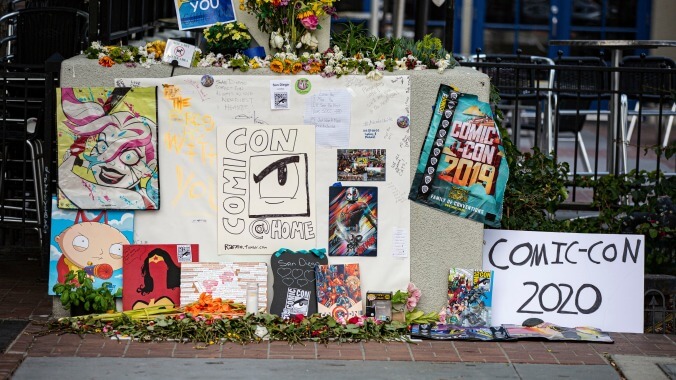This past weekend was Comic-Con, often the biggest event of the year for pop culture news (specifically of a superhero/sci-fi/fantasy flavor), but this year was a little different. Due to the coronavirus, the actual Comic-Con event in San Diego—where people dress up in costumes, ignore the existence of comic books and the people who make them, and then wait in lines for hours and hours so they can see Jason Momoa from 50 feet away—was canceled, leaving the organizers to set up an online replacement even called Comic-Con@Home that would have the same star-studded panels and announcements but without the need for anyone to get in sick.
The catch, of course, was that due to the nature of the event, which was assembled in a matter of months and held totally online, some of the biggest names in Comic-Con news (i.e. Marvel Studios and DC) didn’t attend. There was some Walking Dead stuff and we saw the first two minutes of The New Mutants, but the biggest superhero news of the weekend came from some stuff Zack Snyder said at the not-quite-official JusticeCon event. (Warner Bros. official Comic-Con replacement will be the DC FanDome in August).
According to Variety, the response to this online version of Comic-Con was a resounding “meh,” with social media analytics company ListenFirst saying that tweets about Comic-Con were down 95 percent from last year, with talk surrounding the top TV events down 93 percent and down 99 percent for the movie events. The YouTube archives of panels don’t even have a lot of views, with ListenFirst noting that comments were disabled on Comic-Con@Home videos, preventing any of them from having the kind of fan interaction that generally happens at Comic-Con. Now, it’s totally unfair to judge this Comic-Con against a normal Comic-Con, but this lack of interest is interesting when compared to the video game industry’s E3.
E3 was on shaky ground last year, in terms of people caring about it, since no companies were ready to say anything about their new consoles and Sony skipped the event entirely. With no E3 this year, video game companies also set up their own online announcement events, and while they haven’t always been great, they haven’t been ignored. It could be that fans are used to being able to attend Comic-Con so some kind of online approximation isn’t what they want, while—up until recently—E3 was a press-only event so fans couldn’t attend anyway. Who knows. Either way, this should all hopefully be over by the time next year’s Comic-Cons and E3s roll around, so maybe it doesn’t matter.

 Keep scrolling for more great stories.
Keep scrolling for more great stories.
